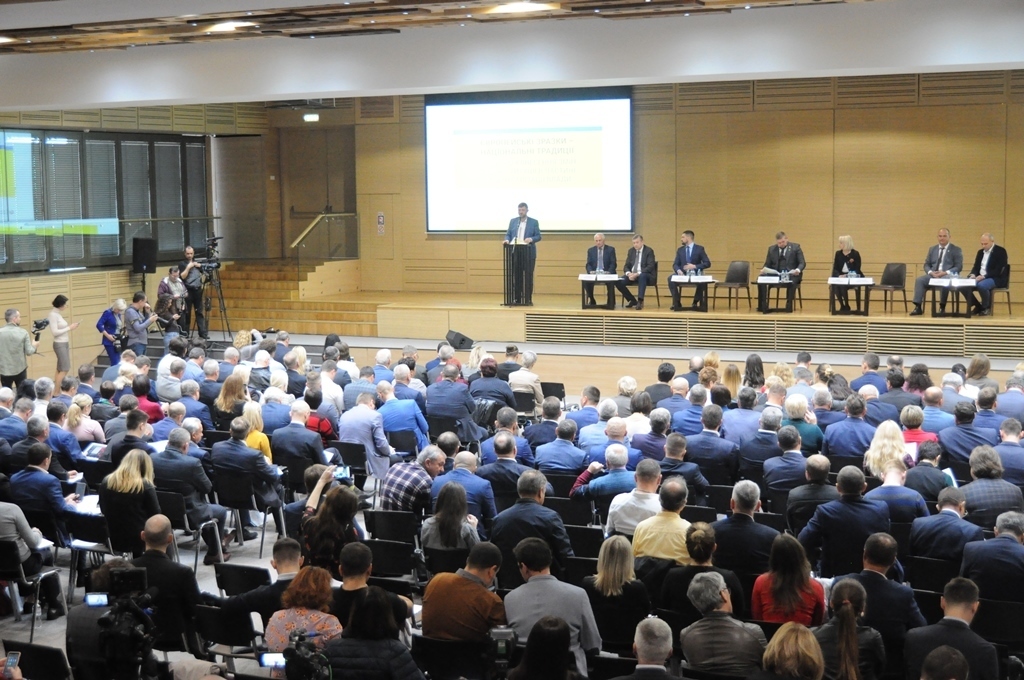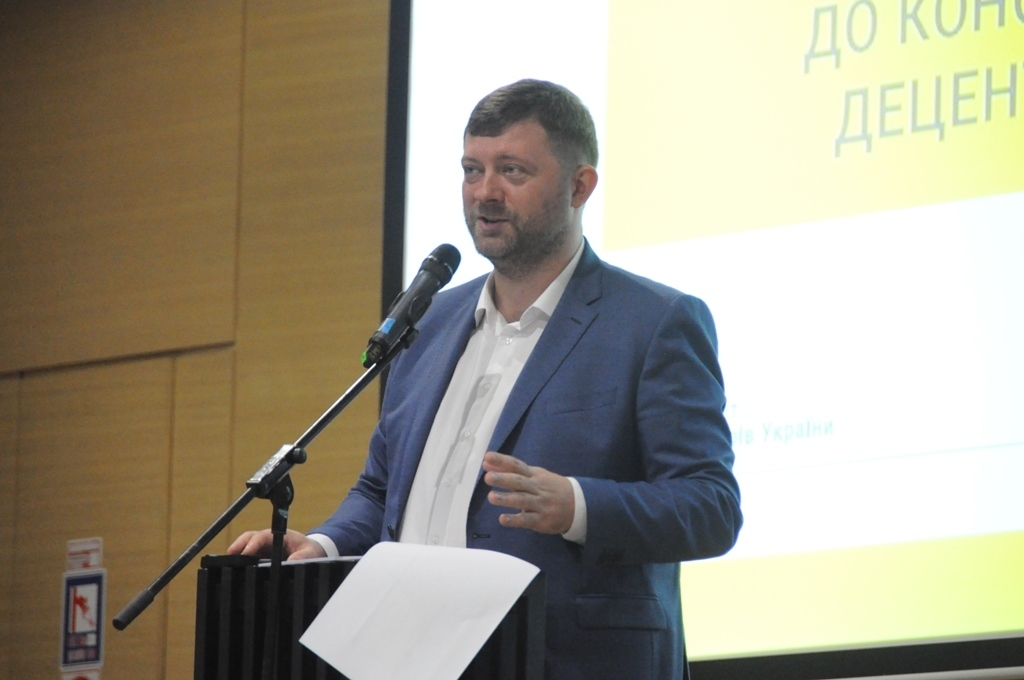Without rayons and state administrations, but with districts and prefects, - what changes to Constitution will envisage
“We are carrying out decentralisation according to the European models, but at the same time we rely on the historical traditions of local self-government in Ukraine,” started his speech Oleksandr Korniyenko, Member of the Parliament, member of the Commission on legal reform issues, at the presentation of the concept for the draft amendments to the Constitution as part of decentralisation.
The changes to the Constitution, to be proposed, should bring power to people, ensure the implementation of the European Charter of Local Self-Government, make irreversible the process of decentralisation, create a new capable administrative and territorial order.
The principles of forming the local self-government system, on which these changes to be based, are the same ones as in the developed European countries:
- Subsidiarity – a problem is solved where it originated, and services are provided at the nearest to people level.
- Ubiquity – there will be no more areas, on which the jurisdiction of local governments does not spread.
- Financial self-sufficiency - the material and financial background of local self-government is land, property, natural resources, local taxes and fees, part of national taxes.
"We also leave an important principle in the Constitution - the state compensates the costs of local governments caused by decisions of public authorities", said Oleksandr Korniyenko.
As for the specific changes in the administrative and territorial order, authors of the concept propose a three-level system: hromada - district - region.
A hromada is a main (basic) link of local self-government. The entire territory of the country will be covered by hromadas. The most powers are transferred at the level of hromadas. A hromada’s head and council are proposed to be elected for 4 years instead of 5 as it is now. A hromada’s council forms an Executive Committee managed by a head of the hromada.
A district is a sub-regional level. Consequently, rayons are dissolved, but districts appear at the sub-regional level. A district is not a substitute for the modern rayon. The area of the districts will be much bigger, and therefore their number will be much less - about 100 (now we have 490 rayons). The function of districts is not the same as modern rayons have now. The authors of the concept are in favor of the fact that the district is a purely administrative unit and there will be no local government at this level. Accordingly, there will be no local councils.
"There are some philological discussions about how to name this level - district, county or rayon. And we will discuss all the proposals. But the important thing is not how it will be called, but how it will work, what the content will be. And we see a purely administrative function as the most effective one at the sub-regional level,” said Oleksandr Korniyenko.
While he noted that the possibility of self-government at the level of the district is still being considered.
A region is all modern 24 oblasts and the Crimea. Their boundaries will not change. In the regions there will be councils, which can form their executive bodies unlike modern oblast councils. A council will be elected for 4 years, not 5 as it is now. The main task of the council is the development of the region, adoption of the budget, implementation of state programmes, management of common property of hromadas in the region, etc.
The changes will affect not only local self-government, but also executive authorities. Local administrations will be dissolved. Instead, it is proposed to introduce a prefect’s institution. Of course, there will be a transitional period for establishing and commissioning this institution.
The prefects are expected to be civil servants. They will be appointed and dismissed by the President upon the submission of the Cabinet of Ministers. Prefects will work in the region or district for three years. Then it will be a mandatory rotation. It is impossible to be a prefect of the same territory for two consecutive terms.
“We are taking a course on professionalising prefects. With constant rotation, a prefect becomes more professional and experienced. This was not the case with heads of the OSA and the RSA, which changed with the new government in the country,” said Oleksandr Korniyenko.
Prefects will ensure the interaction of the territorial central bodies of executive authorities and will oversee their observance of the Constitution and laws of Ukraine.
Prefects will also coordinate the implementation of government programmes in the reporting territory.
The prefect's authority is to direct and organise the activities of the territorial central bodies of executive authorities and to ensure their interaction with the local self-government bodies in the conditions of the martial law or emergency state, extraordinary environmental situation.
The prefect's most debatable authority is to oversee the observance of the Constitution and laws of Ukraine by local governments.
The authors of the concept continue suggesting that the acts of local self-government bodies which, according to the prefect, do not comply with the Constitution or laws of Ukraine, may be terminated by the prefect and at the same time the application to the court may be submitted. And only the court can cancel them if they are indeed declared illegal.
But the acts of local self-government bodies that threaten the security or territorial integrity of Ukraine, the prefect will be able to abolish immediately.
“The question, of which decisions of the local self-government bodies the prefect can suspend, and which - no, is still being discussed. Now we are collecting proposals from the public and from associations of local self-government bodies, based on which we will prescribe this norm in the relevant bill,” said Oleksandr Korniyenko.
The Member of the Parliament also informed that in parallel with the above amendments to the Constitution, bills important for the implementation of decentralisation were being worked out: on the administrative and territorial order, on the local self-government, on the service in the bodies of local self-government, etc.
It is expected that the draft constitutional amendments will be forwarded to the Constitutional Court of Ukraine already at the current session of the Verkhovna Rada.
Tags:
Constitution prefect Konstytutsiia obhovorennia Oleksandr Korniienko
Source:
Прес-центр ініціативи «Децентралізація»
20 February 2026
Місцева статистика: Як перетворити розрізнені...
У Києві відбулася стратегічна зустріч "Статистика громад", організована Державною службою статистики України за...
20 February 2026
I_CAN launched a nationwide rollout of its Public Investment Management Training Programme for local governments and...
20 February 2026
Language of Development Part 2: Funds and Instruments of EU Cohesion Policy
Language of Development Part 2: Funds and...
With the “language of development”, we describe not only the goals and principles of EU regional policy, but also...
19 February 2026
Анонс: вебінар «Обговорення змін до Порядку...
Які практичні кроки мають здійснити керівники та педагоги, щоб ефективно впровадити ключові зміни до Порядку...

